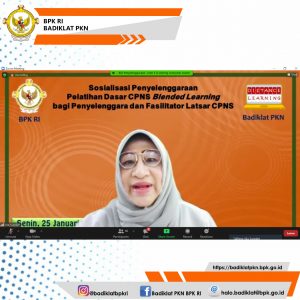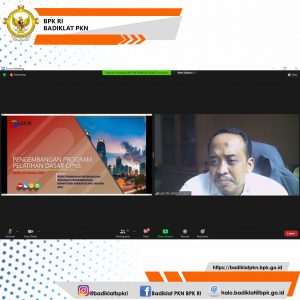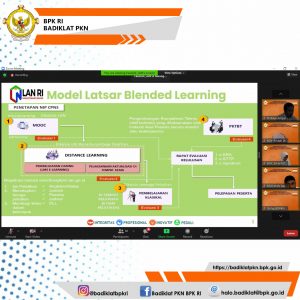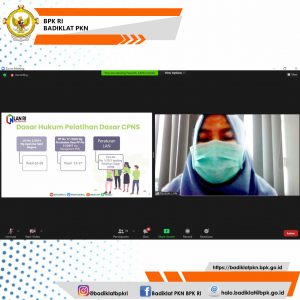 Blended learning is an integrated training that combines classical methods and distance learning. In blended learning, there are 3 method types such as independent training, distance learning, and classical learning. The Head of the Legal and Public Relations Bureau of State Administration Institute (LAN) RI, Tri Atmojo Sejati, ST, SH, M.Sc. explained it when starting his presentation in the Socialization of Blended Learning Implementation of CPNS Basic Training for CPNS Basic Training Organizers and Facilitators, Monday (25/01).
Blended learning is an integrated training that combines classical methods and distance learning. In blended learning, there are 3 method types such as independent training, distance learning, and classical learning. The Head of the Legal and Public Relations Bureau of State Administration Institute (LAN) RI, Tri Atmojo Sejati, ST, SH, M.Sc. explained it when starting his presentation in the Socialization of Blended Learning Implementation of CPNS Basic Training for CPNS Basic Training Organizers and Facilitators, Monday (25/01).
The blended learning method is one of the efforts made by LAN in anticipating the development of existing conditions during the Covid-19 pandemic, especially regarding the basic training implementation that needs to be adjusted. As planned, the Training Institute of State Finance Audit will hold Basic Training for CPNS starting February 2021 which will be attended by 282 BPK CPNS participants of level III , 66 participants of level II, and 102 Bappenas CPNS.




To give briefing to CPNS basic training organizers and facilitators and to equalize perception and understanding of the policies and guidelines for implementing the CPNS basic training, this socialization activity was held. In this socialization, it was conveyed about the policies and guidelines for implementing CPNS basic training, namely the implementation of CPNS basic training with a different blended learning method from the previous year. This learning method is contained in LAN Regulation No. 1 of 2021 regarding the CPNS Basic Training Regulations which replace the LAN regulation No. 12 of 2018. In addition, on this occasion the speakers also delivered material related to implementation design and management learning strategies as well as full e-learning learning methods that have been prepared by LAN to anticipate if blended and classical learning activities cannot be applied in educational activities and training.
Through this activity, Director General of the Training Institute Dra. Ida Sundari, MM, CSFA., hoped that besides being able to provide complete information regarding the changes in the provisions for implementing basic training course, it can also be an arena for further communication with LAN, especially to provide an evaluation of the basic training activities organized by Badiklat so as to improve quality of training organizing for improving employee competence.
